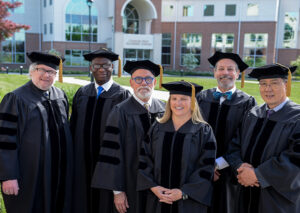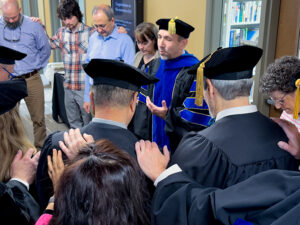Among the more than 50 academic programs across Lancaster Bible College | Capital Seminary & Graduate School—from associate to doctoral, in class, hybrid and online—the college offers four terminal degrees that mark the pinnacle of student learning:
1. Biblical Studies (PhD)
Students become biblical scholars and gain deep insights into the Word of God, as they also expand their mastery of the original languages of the Bible, cultural backgrounds of the Bible, significance of the intertestamental period, and the history of hermeneutical frameworks and theological developments from the early church through the present.
2. Educational Leadership (EdD)
In this online program, Christian scholar-practitioners prepare for relevant, relational and reflective educational leadership. Designed for practicing educators who want to make a difference through servant leadership, students are inspired to lead positive, systemic change, desire to navigate complex problems and design solutions, and excel at collaboration, listening and reflection.
Further Reading: Meet LBC | Capital’ first Doctor of Education cohort!

Doctoral graduates gather on LBC’s main campus at graduation 2023.
3. Leadership (PhD)
Built upon an analytical framework that understands organizations to be dynamic and developmental in nature, LBC | Capital’s PhD in Leadership program promotes a balanced model of leadership that recognizes the importance of biblical values, inspiring vision, godly virtues, and attention to the details of venture management.
4. Ministry (DMin)
LBC | Capital’s online DMin program builds on the knowledge core of biblical, historical and theological interdisciplinary studies often taught during a Master of Divinity program. With a focus on strategic leadership development, the degree exposes students to leadership content and skills training, theological reflection, applied research, social and cultural context.

Faculty, family and friends pray over doctoral students before LBC’s May 2023 graduation ceremony.
Dedicated students within these doctoral programs reach the summit of the educational experience by immersing themselves in a substantial research project that eventually becomes their dissertation—a required project to earn a doctorate. Dissertations can take between one and three years and can range from 175 to 300 pages, depending on the subject.
After choosing a topic that interests them, doctoral students continue their empirical research phase then submit a prospectus, usually Chapters 1-3 of the overall dissertation, for defense. Once approved, the student collects data and develops conclusions, following by writing and defending. In doctoral courses leading up to the dissertation process, students are formally trained in research methodologies as they develop their study of the literature base related to their intended topic. Students also work closely with editors and readers who help guide the research and writing process—asking questions, posing suggestions and serving as mentors and supporters who then become friends and colleagues.
So what fascinating topics have LBC | Capital doctoral students researched and wrote about in their dissertations? Take a look!
- “A Comparative Analytical Framework for Evaluating Theological Inconsistencies Between LXX and MT Ezekiel Resulting from Translation Technique”—Art H.
- “Introducing Illocutionary Intent-Infused Meaning as a Basis for Establishing Validity in Theological Interpretation and Application Using Psalm 119:1–8 as a Test Case”—Randal P.
- “The Gospel: An Exegetical Study of The Ευαγγελ– Word Group as Presented in Luke-Acts”—Corey W.
- “Church-Driven Social Change through Relational Community Organizing in Uganda” and
“Achieving Positive Change through Pastoral Transformational Leadership in Uganda”—David M. - “The Limitations and Accommodations of Exegetical and Scholastic Arguments in the Battle for and Against Slavery in the Mid-1800s—A Historiographical Study” and “From ‘John Doe’ to John Smith: Moral Leadership Amidst Moral Chaos, Demerara, 1816-1823”—Ivanildo T.
- “The Role of Disorienting Dilemma, Self-Assessment, and Critical Reflection Within the Transformative Learning Process” and “Factors Contributing to The Black/White Racial Wealth Gap and Potential Influence on Wealth-Building Perspectives of African Americans in the U.S.”—Valerie P.
- “A Cultural Approach to Leadership in Higher Education” and “Problematizing Power and Privilege with Culturally Diverse Students in Higher Education”—Sherry B.
- “A Qualitative Phenomenological Study of Teacher Perceptions of the Integration of Values into Teaching and Learning at Mukono Christian University”—Vincent B.
- “A Phenomenological Study of Participants’ Perceptions of the Sustained Impact of Short-Term Missions”—Timothy D.
- “Christian AI/AN Spiritual Formation: A Phenomenological Study of Trauma from Past Abuse and Shame to Intrapersonal Resolve”—Tom F.
- “Organizational Climate Factors that Impact Volunteer Satisfaction and Retention in a Faith-Based NPO in New York City”—David L.
- “Impact of Hermeneutics Skills Training on Demystifying Uganda’s Pentecostal Pastors’ Anti-Intellectual Attitude to Desire Additional Theological Education”—Edward K.
- “The Impact of a Mentoring Program on the Character of 18- to 29-Year-Old Male Leaders in the New Hope Network”—Douglas B.
- “The Chaplain’s Role in Improving and Simplifying the Advance Care Planning Workflow on the Heart Failure Unit”—Ajibola F.
- “The Employment of a Mentoring Model as a Heuristic for Continued Development of Emerging Leaders in New Hope Tokyo”—Talo S.
- “The Relentless Pace of Ministry: Implications for a Ministry Leader’s Relationships”—Don L.
- “Enhancing the Spiritual Well-Being of Adjunct Faculty in Online Accelerated Higher Education”—Mark S.